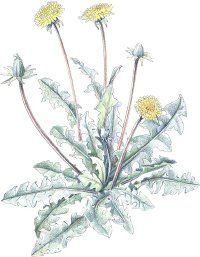Did you know an extremely useful medicine and food already grows in your yard -- and you probably consider it a lawn pest? In fact, if you've spent countless hours battling your dandelions, you might find a certain satisfaction in abandoning your hoes and sprays and simply eating the enemy.
The entire plant is used in herbal remedies: roots, leaves, and flowers. The flowers are not usually eaten, but they are used to make wine. The wonderful weed has a strong herbal remedy purpose, and can help with digestion and other bodily functions.
Advertisement
Uses of Dandelion
Gathered early, after the spring's first warm spell, the leaves and roots are used as a spring tonic and to stimulate digestion and vitality after a long winter.
Dandelion greens also have been used as a diuretic, an agent that promotes the loss of water from the body through urination. Their diuretic effect can make dandelion greens helpful in lowering blood pressure and relieving premenstrual fluid retention.
Dandelion roots contain inulin and levulin, starchlike substances that may help balance blood sugar, as well as a bitter substance (taraxacin) that stimulates digestion. The very presence of a bitter taste in the mouth promotes the flow of bile from the liver and gallbladder, as well as hydrochloric acid from the stomach.
Bitters have been used for centuries in many countries before meals as a digestive stimulant. Do you avoid bitter-tasting foods? Many people do, but this may not reflect a balanced appetite. According to Asian philosophies, the diet should contain foods that are sweet, salty, sour, and bitter. The few bitter tastes Westerners embrace are coffee, wine, and beer, which may have something to do with the higher incidence of digestive diseases in Western cultures, compared with Asian cultures. Dandelion leaves are also rich in minerals and vitamins, particularly calcium and vitamins A, C, K, and B2 (riboflavin).
Besides the stimulating bitter substances, dandelion roots also contain choline, another liver stimulant. Dandelion roots make wonderful colon cleansing and detoxifying medications because any time digestion is improved, the absorption of nutrients and the removal of wastes from the body improve as well.
Many people could use a little extra support for the liver: We are inundated daily with chemicals and substances that the liver must process. The liver must filter impurities from the bloodstream -- all the car exhaust, paints, cleaners, solvents, preservatives, pesticide residues, drugs, alcohol, and other toxins we encounter can begin to tax the liver. Add a diet high in fat, which the liver must emulsify with bile, and a person could experience physical symptoms from this burden on the liver.
Rough dry skin and acne, constipation, gas and bloating, frequent headaches, and premenstrual syndrome are all potential symptoms of an overburdened liver.
Dandelions also are recommended for wart removal. The roots, stems, and leaves of the dandelion exude a white sticky resin when injured. Applied directly to warts daily or, preferably, several times a day, this resin slowly dissolves them.
In the next section, you will learn how to prepare dandelion for herbal remedies and some of the potentially dangerous side effects.
To learn more about treating common medical conditions at home, try the following links:
- For an overview of all of our herbal remedies, go to the main Herbal Remedies page.
- To learn more about treating medical conditions at home, visit our main Home Remedies page.
- One of the best things you can do for your health and well being is to make sure you are getting enough of the vital nutrients your body needs. Visit our Vitamins page to learn more.
This information is solely for informational purposes. IT IS NOT INTENDED TO PROVIDE MEDICAL ADVICE. Neither the Editors of Consumer Guide (R), Publications International, Ltd., the author nor publisher take responsibility for any possible consequences from any treatment, procedure, exercise, dietary modification, action or application of medication which results from reading or following the information contained in this information. The publication of this information does not constitute the practice of medicine, and this information does not replace the advice of your physician or other health care provider. Before undertaking any course of treatment, the reader must seek the advice of their physician or other health care provider.Before engaging in any complementary medical technique, including the use of natural or herbal remedies, you should be aware that many of these techniques have not been evaluated in scientific studies. Use of these remedies in connection with over the counter or prescription medications can cause severe adverse reactions. Often, only limited information is available about their safety and effectiveness. Each state and each discipline has its own rules about whether practitioners are required to be professionally licensed. If you plan to visit a practitioner, it is recommended that you choose one who is licensed by a recognized national organization and who abides by the organization's standards. It is always best to speak with your primary health care provider before starting any new therapeutic technique.
Advertisement
